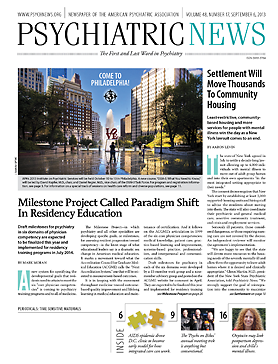It is tough to stay ahead of the curve these days in social media. New trends rise and fall, and the now ubiquitous Facebook and Twitter logos are accompanied by Pinterest, Google+, and LinkedIn, among others. There’s a growing cacophony of services vying for our attention, all claiming to serve our needs, and we’ve grown accustomed to information overload. If you’re at all like me, you’ve already selected your one or two sources and left the rest, hoping that the ones you rely on deliver the content you need to stay abreast of the latest developments and help you be the best clinician you can be.
The Board of Trustees met in July and set in place the processes to ensure that APA has a presence in our social-media lives. I’m pleased to report very broad support for the recommendations, which came from a work group charged with improving the APA experience for members-in-training (MITs), fellows, and early career psychiatrists (ECPs).
Rather than focusing on specific membership benefits, the work group strove to put in place the staff support and process measures that will ensure that our organization has the resources necessary to deliver exemplary services to its future membership. Together with Dr. Saul Levin, the incoming CEO and medical director, and under the leadership of APA President Dr. Jeffrey Lieberman, APA has already taken steps to hire additional staff support for services geared to ECPs (see page 9). In July the Board took action to create an advisory panel of MITs and ECPs that will work closely with APA staff to ensure a smooth continuum of services from the first year of residency to the first years of practice. Undoubtedly, some of those services will include improved communications and social-media usage.
In that vein, I’m excited to report that staff of APA’s Department of Information Services are pursuing new avenues of member communication, outreach, and support that could be available as a pilot initiative as early as this fall to ECPs and MITs. Our annual meeting in San Francisco was a resounding success, in part, because of our shared Facebook group for MITs attending the meeting. The Facebook group allowed for facile communication, networking, and instant feedback regarding the ins and outs of the large meeting. APA leadership was able to respond quickly to MIT concerns, share real-time information on meet-and-greet gatherings, and connect MITs with housing and mentorship opportunities.
The new initiatives currently being pursued by APA staff would allow for a very similar social-networking experience across all mobile and Web-based platforms and would be free with APA membership (think “Facebook meets LinkedIn”) tailored to APA. It has the potential to provide the platform for members to join APA-curated groups or form their own. Most APA services could have access to these online “groups,” providing streamlined information for everything from Psychiatric News to the American Journal of Psychiatry and advocacy and government relations, all nuanced to specific APA demographics. I look forward to gathering feedback on this and other initiatives as we seek to pilot them in the coming year.
These efforts are examples of the ways in which APA leadership is working toward creating an organization that is innovative, responsive, and welcoming—and an indispensable ally for all those wanting to stay ahead of the information-technology curve. ■

